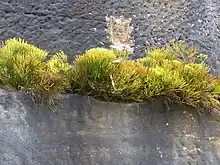| Psilotum nudum | |
|---|---|
 | |
| Scientific classification | |
| Kingdom: | Plantae |
| Clade: | Tracheophytes |
| Division: | Polypodiophyta |
| Class: | Polypodiopsida |
| Order: | Psilotales |
| Family: | Psilotaceae |
| Genus: | Psilotum |
| Species: | P. nudum |
| Binomial name | |
| Psilotum nudum | |
| Synonyms[2] | |
| |
Psilotum nudum, the whisk fern,[2] is a fernlike plant. Like the other species in the order Psilotales, it lacks roots.[3]
Its name, Psilotum nudum, means "bare naked" in Latin, because it lacks (or seems to lack) most of the organs of typical vascular plants, as a result of evolutionary reduction. (Note that leaves are not actually absent, but greatly reduced.)[3]
Development
The embryo has only two parts, a distal shoot apex and a proximal foot. The shoot apex produces a rhizome without roots, possibly because P. nudum and relatives are often epiphytes. The rhizome in turn will eventually produce greatly reduced leaves instead of roots. These processes are heavily influenced by auxin concentrations.[4]
Distribution
P. nudum is found in tropical Africa, Central America, tropical and subtropical North America, South America,[5] tropical Asia, Australia, Hawaii, southern Japan, Lord Howe Island, New Zealand, with a few isolated populations in SW Europe ("Los Alcornocales", Spain, Cádiz province).[6][7] Although most weeds are flowering plants, P. nudum is an unusual example of a weed because it is both nonflowering and rootless.[8]
In tropical areas, this plant is often epiphytic, whilst in more temperate areas, such as south-eastern Australia, it is usually found growing in rock crevices.[7] Thousands of people per day walk by these plants at the Sydney Opera House forecourt.[9]
Cultivation and uses
The plant, which grows wild in southern Japan, was once much cultivated in Japanese gardens as an ornamental plant. Slightly over 100 garden varieties were given fantastic names.[10] [11] Called matsubaran ("pine-needle orchid") in Japanese, it was one of the noble plants in the Edo period (1603–1867).

The species is naturally found on all the main Hawaiian Islands. Known locally as Moa because of its chicken feet like stems, the Hawaiians collected large quantities of the spores and used them like talcum powder,[12] under the loincloth to prevent chafing. The spores were also used medicinally as a purge. Children would play a game called 'moa nahele' or cockfighting with the branch stems. Twigs of the Moa were interlocked and the players pulled on the ends. The loser's twig broke and the winner crowed like a rooster.[13] The species is still often used in making traditional Hawaiian leis.
Its common name, whisk fern, alludes to its use in the past as a small broom, made by tying a handful of its branches together.[14] It is sometimes found in cultivation (either accidentally, as a weed in greenhouses, or deliberately, in the form of a number of cultivars).[5]
It may prove to be a good source of antimicrobial chemicals.[15]
References
- ↑ Bárrios, S. & Copeland, A. (2021). "Psilotum nudum". IUCN Red List of Threatened Species. 2021: e.T18821051A192161425. Retrieved 19 May 2022.
- 1 2 3 Hassler, Michael. "Psilotum nudum". World Ferns. Synonymic Checklist and Distribution of the World Flora. Retrieved 19 May 2022.
- 1 2 Friedman, William E.; Moore, Richard C.; Purugganan, Michael D. (2004). "The evolution of plant development". American Journal of Botany. Botanical Society of America (Wiley). 91 (10): 1726–1741. doi:10.3732/ajb.91.10.1726. ISSN 0002-9122. PMID 21652320.
- ↑ Cooke, Todd J; Poli, DorothyBelle; Cohen, Jerry D (2003). "Did auxin play a crucial role in the evolution of novel body plans during the Late Silurian-Early Devonian radiation of land plants?". The Evolution of Plant Physiology. Elsevier. pp. 85–107. doi:10.1016/b978-012339552-8/50006-8. ISBN 978-0-12-339552-8.
- 1 2 "Psilotum nudum". Flora of North America.
- ↑ "Psilotum nudum" (PDF). Atlas y Libro Rojo de la Flora Vascular Amenazada de España (in Spanish).
- 1 2 Fairley, Alan; Moore, Philip (1989). Native plants of the Sydney District (1st ed.). Kangaroo Press. p. 27. ISBN 0-86417-261-3.
- ↑ Baker, Herbert G (1974). "The Evolution of Weeds". Annual Review of Ecology and Systematics. Annual Reviews. 5 (1): 1–24. doi:10.1146/annurev.es.05.110174.000245. ISSN 0066-4162.
- ↑ Les Robinson - Field Guide to the Native Plants of Sydney, ISBN 978-0-7318-1211-0 page 303
- ↑ Rouffa, A. (1971) "An Appendageless Psilotum. Introduction to Aerial Shoot Morphology." American Fern Society 61(2), 75-86
- ↑ Gardener's Chronicle (August 13, 1887 ) pp. 190-191. 120 varieties.
- ↑ Carr, G. "Psilotaceae". University of Hawai`i at Manoa. Retrieved 1 April 2010.
- ↑ Mary Kawena Pukui; Samuel Elbert (1986). Hawaiian-English Dictionary. University of Hawai‘i Press. p. 248.
- ↑ Ombrello, T. "Psilotum". Union County College Biology Department. Archived from the original on 15 October 2010. Retrieved 1 April 2010.
- ↑ Dolly Rani; P. B. Khare; P. K. Dantu (2010). "In vitro antibacterial and antifungal properties of aqueous and non-aqueous frond extracts of Psilotum nudum, Nephrolepis biserrata and Nephrolepis cordifolia". Indian Journal of Pharmaceutical Sciences. 72 (6): 818–822. doi:10.4103/0250-474X.84606. PMC 3178992. PMID 21969763.
External links
 Media related to Psilotum nudum at Wikimedia Commons
Media related to Psilotum nudum at Wikimedia Commons
